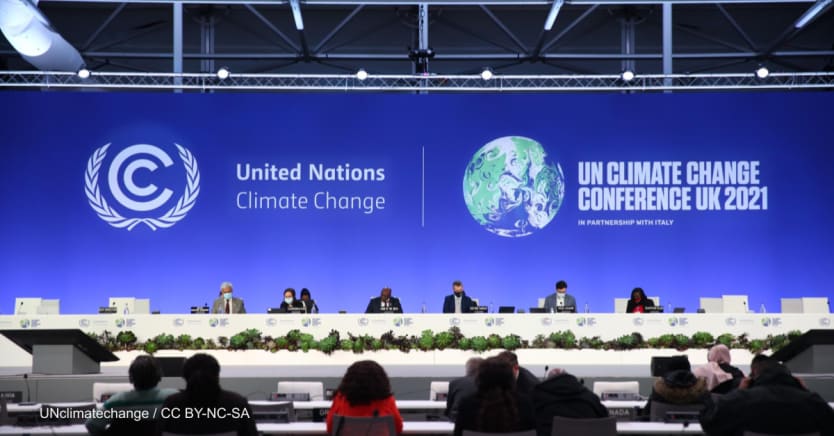
Civil society activists have criticized what they call a “quasi ban” on observing negotiations at COP 26 in Glasgow, amid fears that observers will be excluded again from talks.
All you need to know from COP 26
To get on-the-ground coverage, in-depth analysis, and behind-the-scenes reporting from COP 26, sign up for our special edition newsletter on this year’s climate summit.
Anger over an alleged lack of transparency in negotiations mounted Wednesday, following concerns that just four observers from environmental groups were allowed into negotiations as the summit opened on Monday and Tuesday.
"The quasi ban on observers presence in the negotiating areas has now been lifted but we continue to receive warnings that access to the COP might be suspended for civil society observers and continue to experience challenges accessing some of the negotiating rooms,” said Sébastien Duyck, senior attorney for the climate and energy program at the Center for International Environmental Law.
Duyck added: “The presidency and Secretariat must guarantee that no more arbitrary restrictions will be imposed on the participation of civil society representatives."
“All of us in civil society are worried about aspects of access here,” Danny Sriskandarajah, chief executive of Oxfam GB told a press conference earlier in the day.
Concerns over transparency were compounded by frustration around the Glasgow event’s logistics, which prompted the organizing United Nations Framework Convention on Climate Change to send out an apologetic email Tuesday evening.
A separate grouping of civil society organizations, the COP 26 Coalition, voiced concerns about lengthy queues and capacity issues disrupting the event.
“This climate summit isn’t just the least accessible ever and a chaotic shambles, it’s grossly unjust,” said Dorothy Guerrero, a spokesperson for the group.
“When so many people from the world’s most impacted countries weren’t able to make it, and delegates are being told to ‘dial in’ from their hotel rooms — something is seriously wrong,” Guerrero added.
“People have paid thousands of pounds to be here, often out of their own pocket, risking their own health, yet they are met with mammoth queues and told to stay away. This summit should have been about serious action on the climate emergency, yet once again the U.K. has designed a summit that quite literally excludes people from having their voices heard,” Guerrero said.
Even for those tuning in remotely, technical restrictions interfered with being able to follow the proceedings. Joe Thwaites, a researcher with the World Resources Institute, tweeted it was “nonsensical” that a webcast of a finance event could only be viewed by registered participants in Glasgow and a “clear example of how [UNFCCC] is restricting online participation far more than even in non-pandemic years.”
Alok Sharma, president of COP 26, and Patricia Espinosa, UNFCCC’s executive secretary, defended how the event had been run, blaming capacity issues on the health measures and complex logistics required by hosting the event amid a pandemic.
Sharma said he and Espinosa were “not complacent” about civil society participation. He added: “We have a regular discussion, every day in fact, to try and address the issues that are emerging … We are aware that observers have raised some of these issues and we will ensure that access to them is available.”
Sharma said a ticketing system for observers had been discussed by governments but “felt that wasn't the right approach.”




